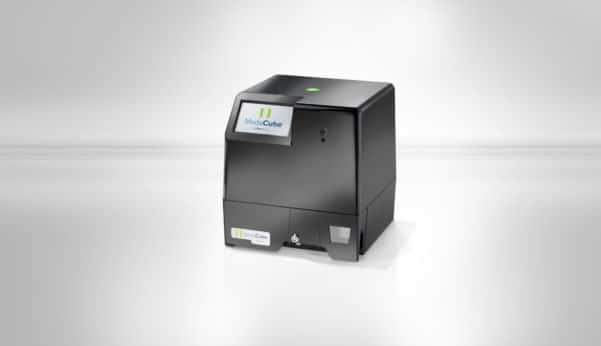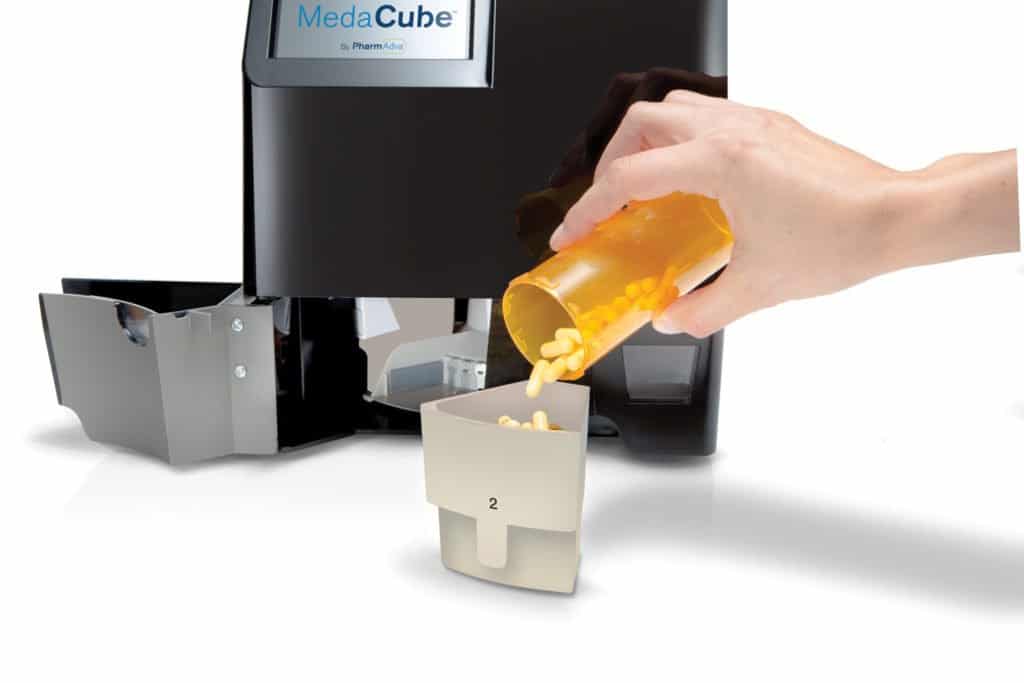
MedaCube Automatic Medication Dispenser Review

Managing multiple medications can be challenging for seniors; as a result, missed doses and medication errors lead to many hospitalizations each year. The MedaCube Automatic Medication Dispenser provides an automated solution that makes medication management simpler and more reliable. Our team extensively tested the MedaCube to determine whether this premium medication dispenser is worth its substantial price tag.
Key Findings
- The MedaCube claims to significantly improve medication adherence with a 97 percent adherence rate compared to just 49 percent adherence without the MedaCube, making it ideal for seniors managing complex medication regimens.
- At $1,999, it’s one of the most expensive medication dispensers on the market, but its bulk loading system for up to 16 medications and 90-day supply capacity makes it more efficient than dose-by-dose dispensers.
- Advanced features such as customizable voice prompts, caregiver notifications, and cloud-based medication tracking provide comprehensive support for both seniors and their caregivers.

MedaCube Pros and Cons
What We Like
- Bulk loading system: When testing the MedaCube, we were impressed by how quickly we could load multiple medications. It took us less than two minutes per medication, compared to the tedious process of loading individual pills in manually filled dispensers like the Pria Medication Dispenser.
- High-capacity storage: The ability to store up to a 90-day supply of 16 different medications means significantly less refilling time compared to other medication dispensers we’ve tested.
- Proven effectiveness: MedaCube is the only medication dispenser tested in an FDA-approved clinical trial, which demonstrated a dramatic improvement in medication adherence.
- Comprehensive notification system: When we deliberately missed a dose during testing, the system not only alerted us through the device but also sent text and email notifications to our designated caregiver accounts.
- Picture verification: We found the ability to see images of each dose through the web portal particularly useful for verification and peace of mind.
What Could Be Better
- High price point: At $1,999, the MedaCube is significantly more expensive than competitors like Hero ($44.99 monthly subscription) and Pria ($449 + $9.99 monthly subscription).
- Size and weight: During our testing, we found the unit quite bulky (about the size of a small microwave), making it somewhat challenging to place in smaller living spaces.
- Learning curve: While the interface is relatively straightforward, we noticed during our testing that some seniors might need assistance with the initial setup and learning to use the touch screen.
- Power dependency: Despite having a 24-hour battery backup, we found during our power outage simulation that the device requires reasonably consistent power access for optimal functioning.
- No smartphone app: Unlike some competitors we’ve tested, MedaCube relies on a web portal rather than a dedicated smartphone app, which some users may find less convenient.
MedaCube Purchasing Process
We found the ordering process for our MedaCube straightforward on the company’s website. The MedaCube arrived well-packaged with clear instructions for setup. Based on our experience, here’s what you need to know about purchasing:
The MedaCube 2.0 is available directly from the manufacturer’s website, which we found to be the most reliable purchasing method. The base package includes:
- MedaCube 2.0 dispenser unit
- Power adapter and cord
- Two keys for the lockable cabinet
- Integrated internal Wi-Fi
- User manual and quick start guide
Did You Know: MedaCube offers a free one-year warranty with an option to extend to a comprehensive two-year warranty for an additional $300. We recommend this option given the substantial investment.

MedaCube Costs
The MedaCube represents a significant investment in medication management:
- Base unit cost: $1,999.00
- Standard warranty: One-year (included)
- Extended warranty: Two-year comprehensive coverage (+$300)
- Optional accessories:
- Expanded Bin Set for additional medications (price varies)
- Additional accessories available on their website
In our comparison of medication dispensers, we found that MedaCube has a substantially higher up-front cost than most competitors. However, unlike some competitors that require ongoing subscription fees, MedaCube has no mandatory monthly charges.
For comparison’s sake, the Hero Medication Dispenser we tested cost nothing for equipment, and we only paid a $44.99 monthly charge. MedaCube’s bulk loading system and higher capacity could potentially save significant time for caregivers managing complex medication regimens, however.
Using MedaCube
Setup Process
When we unboxed our MedaCube, the setup process took approximately 30 minutes from start to finish. We found the touch screen interface intuitive, walking us through the process step by step. Here’s more about how our setup experience went:
- We placed the MedaCube on a sturdy countertop near a power outlet and within Wi-Fi range.
- After plugging in and powering up the device, we connected it to our home Wi-Fi network using the touch screen interface.
- We created our account on the MedaCube web portal, which allowed us to monitor medication adherence remotely.
- Using the bulk loading system, we added several different medications to test the capacity.
During our setup, we particularly appreciated the QR code scanning feature for prescription bottles. When we scanned one of our test medications, the system automatically uploaded all medication information, saving considerable time compared to manual entry.
Day-to-Day Usage
Throughout our two-week testing period, we used the MedaCube to dispense various medications on different schedules. Here’s what stood out in our day-to-day experience:
The dispenser uses both visual and audio alerts to indicate when it’s time to take medications. During our testing, we found the customizable voice prompts particularly helpful — we recorded friendly reminders that were less clinical and more encouraging.
When it was time for a dose, we simply touched the screen as prompted, and the drawer on the right of the unit popped out with our pills. The process was remarkably straightforward, even when we asked a senior volunteer with limited technology experience to test it.
One feature we particularly appreciated was the ability to dispense as-needed medications with built-in safety features to prevent overuse of medications such as pain relievers. This could be especially valuable for seniors taking anticholinergic drugs or other medications with specific timing requirements.
Remote Monitoring and Reporting
As caregivers, we found the MedaCube’s reporting features exceptionally useful. Through the web portal, we could:
- View detailed adherence reports.
- Check medication inventory levels.
- See exactly when doses were taken.
- View images of each dispensed dose.
- Receive alerts for missed doses or low supplies.
During testing, we deliberately skipped a scheduled dose to test the alert system. Within minutes, we received both email and text notifications that the dose had been missed, allowing for timely intervention.
Pro Tip: When setting up your MedaCube, we recommend adding at least two caregiver contacts for notifications. During our testing, we found having multiple notification recipients ensured that medication adherence issues were addressed promptly even when one caregiver was unavailable.
Final Thoughts on MedaCube
After thorough testing, we found the MedaCube to be a premium solution for seniors and caregivers managing complex medication regimens. Its bulk loading system and high capacity set it apart from competitors, making it especially valuable for users with multiple daily medications.
The MedaCube excels in promoting medication adherence through comprehensive alerting and verification systems. In our comparative testing with other dispensers, we found MedaCube’s approach to be more robust, particularly for seniors who need significant support with medication management. While systems like Hero offer similar functionality at a lower up-front cost, they don’t match MedaCube’s capacity or proven adherence improvements.
The primary drawback is the substantial up-front investment, which may be prohibitive for some users. However, for seniors managing numerous medications or those with a history of adherence issues, the benefits could outweigh the costs — particularly considering that medication errors account for a significant percentage of hospitalizations among older adults.
We recommend the MedaCube for:
- Seniors managing five or more different medications
- Individuals with a history of poor medication adherence
- Families seeking peace of mind through comprehensive medication management
- Situations where caregivers cannot be physically present for daily medication supervision
For seniors with simpler medication regimens or tighter budgets, a more affordable option like Pria or a standard medication organizer might be sufficient.
Frequently Asked Questions
-
How does the MedaCube handle power outages?
The MedaCube 2.0 includes a replaceable 24-hour battery backup. During our testing, we simulated a power outage and found the system continued to function normally on battery power, dispensing medications at scheduled times and maintaining all programmed information. The system also sent alerts notifying our caregiver accounts that the device was operating on battery power.
-
Can the MedaCube dispense liquid medications?
No. In our testing, we confirmed that the MedaCube is designed exclusively for pill-form medications (tablets and capsules). For seniors who need to manage liquid medications, creams, or inhalers, the MedaCube can provide reminders for these nonpill medications but cannot physically dispense them.
-
How secure is the MedaCube for households with children or individuals with dementia?
We found the MedaCube to be very secure during our testing. The medication storage compartments are locked with a physical key, preventing unauthorized access. Additionally, the tilt sensor alerts caregivers if someone attempts to tamper with the device. These features make it appropriate for safe medication disposal and storage in households with children or individuals who should not have unsupervised access to medications.
-
Can multiple users share one MedaCube?
Based on our testing, the MedaCube is designed for a single user’s medication regimen. While technically possible to program multiple users’ medications, this would significantly reduce the capacity per person and could potentially lead to confusion. Families with multiple individuals requiring medication management would likely need separate units.
-
What happens if a dose is missed?
During our testing, we found that if a dose is missed, the MedaCube follows a comprehensive notification protocol. First, it continues to alert the user through visual and audio reminders. If the dose remains untaken after 10 minutes, the system places a phone call to the user. Simultaneously, designated caregivers receive text and/or email notifications about the missed dose, allowing for timely intervention.
Methodology
For this review, our testing team used the MedaCube medication dispenser for a two-week period, simulating various medication regimens and scenarios. We evaluated the product based on several key factors:
- Ease of setup and use
- Reliability of medication dispensing
- Effectiveness of reminder and notification systems
- Remote monitoring capabilities
- Overall build quality and durability
- Value for money compared to competitors
We programmed the dispenser with different medication schedules, deliberately missed doses to test the alert system, and evaluated both the user and caregiver experiences. We also compared the MedaCube to other medication dispensers we’ve previously tested, including Hero, Pria, and traditional pill organizers, to provide context on its relative strengths and weaknesses.
